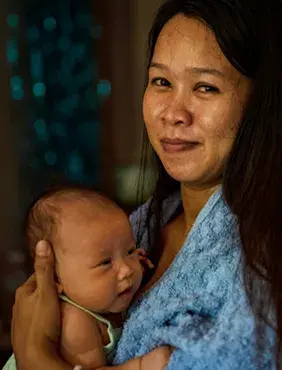In 2021-2022, the United Nation Population Fund (UNFPA) in the Philippines introduced Cash for Maternal Health - Emergency Fund in the conflict-affected Maguindanao province. The Cash for Maternal Health project was designed to facilitate safe pregnancy and delivery. Cash was provided after delivery in a health facility to 850 women as a means of encouraging facility delivery, most often at a rural primary level health facility. Cash for deliveries was part of a holistic emergency response that also supported maternal health programming via numerous interventions including the provision of equipment and kits to facilities, the conduct of medical missions, and the provision of community- based maternal health information sessions.
To assess the impacts of the maternal cash transfer program, UNFPA and the Johns Hopkins Center for Humanitarian Health collaborated to conduct a mixed-methods evaluation from December 2021 to June 2022. A total of 330 Cash for Maternal Health cash transfer recipients were compared to 316 pregnant women and adolescents who were registered to deliver in facilities but did not receive cash assistance in six different municipalities. The evaluation included questionnaire- based interviews pre-delivery (baseline) and post- delivery (end line) for all participants in addition to qualitative interviews with 20 women who received
the cash assistance. The evaluation is intended to provide new evidence to inform planning of maternal health programmes with cash components, both in the Philippines and beyond.
Key findings were as follows:
- Women and adolescents who received cash assistance were significantly more likely than thecomparison group to have a facility-based delivery (86.4% vs.58.7%) and reported that they did so because it was safer for themselves and the baby (85.7%). They were also significantly more satisfied (98.1% vs. 83.9%) and more likely to plan for future pregnancies to be delivered in the facility (95.8% vs. 64.0%) than the women in the comparison group.
- Almost all recipients reported that their husband and/or family members were aware of the assistance (95.4%) and supported receipt of the cash (95.5%). Women either independently (46.3%) or collaboratively (27.9%) decided with their husband how to use the cash, though 25% reported they did not have primary decision-making power. Cash was primarily used to meet household’s food needs.
- Cash did not pose safety risks within the household, and most women (78.5%) reported no change neither better nor worse) in their relationship after receiving the cash. Nearly all women (99.4%) reported they felt safe receiving the assistance.
- There was a preference for future assistance to be provided as cash (59.5%) or through a combination of cash and in-kind assistance (35.1%) and that it be provided directly to women (78.8%).
The findings of this evaluation on the integration of cash assistance into UNFPA Philippines maternal health programming within the Maguindanao emergency response shows that the use of CVA can help strengthen uptake of health services. The cash incentive contributes to women and adolescents visiting health facilitiesmore often throughout their pregnancies, becoming more comfortable doing so, sharing their intention to return to the facilities for subsequent pregnancies, and encouraging other women to do the same.


